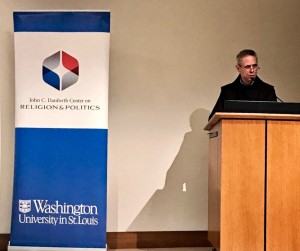
Last night I had the good fortune to attend a lecture at Washington University (where I work) by Father Michael Perry, the American Franciscan friar who is the minister general of the Order of Friars Minor. Sponsored by the John C. Danforth Center on Religion & Politics, Fr. Perry spoke on this theme: “What Do Francis of Assisi and Francis of Buenos Aires Have in Common? A ‘Franciscan’ Perspective on the Common Good.” My write-up here is by no means exhaustive of his roughly one-hour presentation but rather represents what most resonated with me and what I was able to capture in my little notebook…
A little background on Fr. Perry, just to give you an idea of his breadth of experience and education. He spoke from a deep, humble and well-educated place. Born into an Irish household in Indianapolis, Indiana in 1954, Fr. Perry entered the Franciscan seminary at Quincy University in Illinois where he studied philosophy and history. While still a theology student, he went to the Democratic Republic of Congo (ex-Zaire) where he served as pastor, researcher, and professor of mission and cultural studies. He completed his doctorate in social anthropology (religious anthropology) at the University of Birmingham in the U.K. and went on to serve as a foreign policy adviser to the United States Conference of Catholic Bishops, and later as an adviser on African religion and social policy at Franciscans International, U.N./New York. He also served as a policy and programs adviser at Catholic Relief Services. From 2009-13, Fr. Perry served as the Vicar General of the Order of Friars Minor in Rome. Since 2013, he has served as the Minister General (leader) of the Order. He maintains an active interest and engagement in the promotion of peace and reconciliation in Africa, and in the promotion of inter-religious and inter-cultural dialogue.
Fr. Perry began by discussing the “distinct Franciscan social vision” that Francis of Assisi and Pope Francis share. Although the Pontiff is a Jesuit and therefore has an Ignatian worldview, he obviously chose the name Francis for a reason, and this was the rich and fertile ground that Fr. Perry explored with us.
He noted that every event in our lives contains a “message and opportunity to enter into the life of the Other.” These opportunities, he said, involve an interplay of the personal and the political, including the shaping of our shared social life. The obligation to vote, for example, is both a responsibility to ourselves and to the communities in which we live. “I am because we exist,” he said.
Another interplay exists at the intersection of the “singular life of virtue and the anticipation of the reign of God,” he said, quoting St. Thomas Aquinas: “The primary moral virtue is justice.” In a world filled with hatred and with political leaders and other individuals intent on tearing apart any sense of unity and hope, it would be easy to lose heart and give up, he said. However, he quickly added, we must not let such a worldview overtake our own obligations: “Do not run away from your responsibilities,” he said emphatically.
Christianity, highly politicized in today’s American culture, offers us much more than stances on political issues, he said. Our faith offers an approach to engaging in politics, and it is an approach that should be about “community building and consensus, not about making deals.”
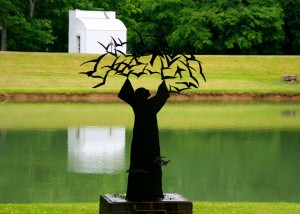
What Pope Francis and St. Francis of Assisi have in common is a spiritual vision of the world, he said, and a preferential treatment of the poor looms large in this vision. Integral to this world vision is the idea that all humans are capable of change and transformation through dialogue with one another. We must be willing to cross boundaries and even be seen as a bit crazy for doing so. Both Francises have been willing to do both of these things, he noted, citing the example of both making unprecedented forays into Egypt to engage with Muslim leaders. “The path forward is always through dialogue,” he said.
Both Francises also hold all life in reverence, and Perry cited examples of writing from each. St. Francis’ idea of “fraternity” includes the belief that we are all part of one family and are responsible for each other, as well as for our planet. He recalled St. Francis’ “Canticle of the Creatures,” a song composed by Francis in 1225 when he was sick at St. Damiano. Also known as the Canticle of Brother Sun, the song, in part, praises God for all creatures (including sun, moon, stars, wind, water, fire and earth).
Turning to Pope Francis, Perry noted the Pope’s second encyclical, published in 2015, Laudato si´, which bears the subtitle, “On Care for Our Common Home.” In it, the Pope critiques consumerism, irresponsible development, environmental degradation, and global warming, and calls all people of the world to take “swift and unified global action.”
This integral ecological vision of the two Francises is both social and environmental, Perry said, addressing both the poverty of the individual and the ongoing care of the natural world that sustains us. The dangers of separating the individual from the community, he noted, are all around us. “We are creating gated hearts, gated minds and gated communities, all filled with people who agree with us. We are re-tribalizing our communities.”
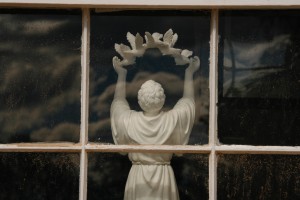
So what do Pope Francis and St. Francis have in common, Perry asked rhetorically to conclude his talk? His answer was one word: “Everything.”
During the question and answer session following the talk, a student asked Perry about the role of mystics in the modern church, asking “Is Pope Francis a mystic?” His response revealed the depth of his heart and mind: “Mystics help others see what is.” So, he gently explained, we need to look beyond traditional definitions of mysticism that emphasize an ascending toward God, and begin to see mysticism as descending.
“Jesus is about going down to where there is pain, darkness and hopelessness and standing in the middle of that,” he said. “That is the beginning [of mysticism.] That is the way of humility — our willingness [like Pope Francis’] to bend down and wash the feet of the Muslim woman in prison.”
Fielding a similar question from a young man about the perils of relativism, he cautioned not to use such labels to categorize people. “We need to look at our wholeness and stop breaking things apart so we can choose the pieces we like,” he said.
He ended with a call for continual discernment and community. “Discernment is so crucial here,” he said, “to create a critical understanding of things and to try to get to the truth. But we need to construct that truth together.”
Note: The Center sometimes posts videos of lectures. Check this site to see if Fr. Perry’s lecture has been added to the list. It might take a few days: http://rap.wustl.edu/video/
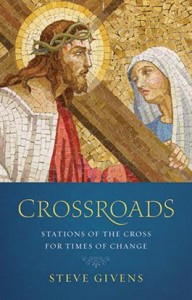 Another note: My newest publication, “Crossroads: Stations of the Cross for Times of Change” has just been released by Creative Communications for the Parish. For more information on this devotional booklet, email me at givenscreative@gmail.com, or visit the publisher’s site.
Another note: My newest publication, “Crossroads: Stations of the Cross for Times of Change” has just been released by Creative Communications for the Parish. For more information on this devotional booklet, email me at givenscreative@gmail.com, or visit the publisher’s site.
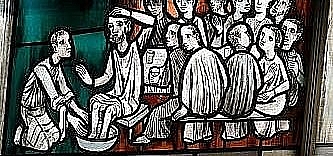


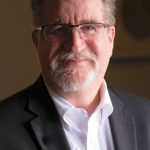
2 comments On Notes from a Lecture: The Two Francises, by Fr. Michael Perry, OFM
Thanks for that Steve. I will certainly check out the website as I would like to read?listen to what Fr Perry said in full. ‘Our faith offers an approach to engaging in politics, and it is an approach that should be about “community building and consensus, not about making deals.”’ This reflects what Winston Churchill once said: “Jaw, jaw rather than war, war”
Thanks, Peter. He was a joy to listen to and learn from…